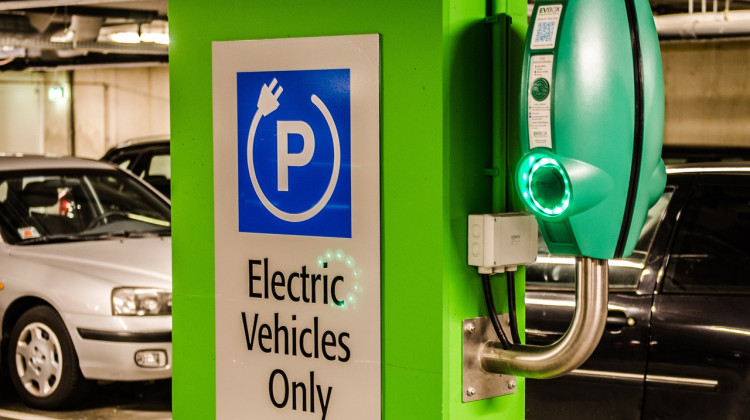
he Indiana Electric Vehicle Charging Neighbor-Hood Green Book lists 38 locations in underserved communities that could host EV chargers that qualify for federal grants through the Biden administration.
PixabayFor two years now, an equity alliance has said Indiana should do more to place electric vehicle charging stations in Black communities.
Now the alliance has chosen its own preferred locations for the federally-funded chargers in its Indiana Electric Vehicle Charging Neighbor-Hood Green Book. The book is a nod to the segregation-era guidebook that listed safe places to stop for Black travelers.
It lists 38 locations in underserved communities that could host EV chargers that qualify for federal grants through the Biden administration.
Jorden Giger co-founded Black Lives Matter of South Bend and is part of the Indiana Alliance for Equity, Diversity and Inclusion of Electric Vehicle Charging Infrastructure and Economic Opportunities Development. He said when Indiana first hosted meetings on EV chargers for the National Electric Vehicle Infrastructure (NEVI) program, many of them weren’t in areas that were accessible to Black Hoosiers — and a few were in cities the Alliance considers sundown towns.
“We want us to be able to drive through the state and charge in places that are safe and friendly to us and our families," Giger said.
While the state’s picks for EV charging locations so far are primarily gas stations right off the highway, the Alliance’s choices are mostly churches less than 5 miles away.
Join the conversation and sign up for the Indiana Two-Way. Text "Indiana" to 765-275-1120. Your comments and questions in response to our weekly text help us find the answers you need on climate solutions and climate change at ipbs.org/climatequestions.
Unlike the speed of filling up a fuel tank in a gas-powered car, even the fastest EV chargers take around 20 minutes to fully charge — which means drivers may spend more money as they wait.
The Alliance said its list proves Indiana can ensure Black communities benefit while complying with the rules of the federal grants.
“We know that for many urban areas in Indiana, highways have been built through our communities and they remain some of the most polluted communities in the state," Giger said.
In a statement, the Indiana Department of Transportation said it just became aware of the green book and would review it in light of the NEVI program. It also expects more funding through the program will be announced this fall.
"The public, as well as interested stakeholders, are encouraged to utilize the program’s interactive map to suggest potential charging station locations. Additionally, INDOT has held numerous meetings and conversations with members of the Alliance throughout the progression of the Charging the Crossroads program and will continue to consider feedback as it is received," INDOT said in a statement.
The Alliance also said it reached out to the Indiana Department of Environmental Management to partner on the state’s application for the Charging and Fueling Infrastructure Grant, but IDEM hasn’t responded. In a statement, the agency said it didn't receive input from the Alliance during its request period — which ended on July 24.
IDEM said, in its application to the Federal Highway Administration this week, 96 percent of the funding for EV chargers will go to disadvantaged communities. The Biden administration mentioned race and ethnicity under guidance for how to define "disadvantaged communities" under its Justice 40 Initiative, but never officially defined the term.
IDEM didn't make anyone available for an interview.
Rebecca is our energy and environment reporter. Contact her at rthiele@iu.edu or follow her on Twitter at @beckythiele.
 DONATE
DONATE






 Support WFYI. We can't do it without you.
Support WFYI. We can't do it without you.